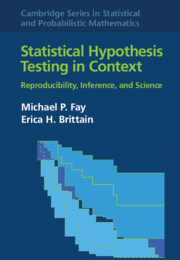Book contents
- Frontmatter
- Contents
- Preface
- 1 Introduction
- 2 Theory of Tests, p-Values, and Confidence Intervals
- 3 From Scientific Theory to Statistical Hypothesis Test
- 4 One-Sample Studies with Binary Responses
- 5 One-Sample Studies with Ordinal or Numeric Responses
- 6 Paired Data
- 7 Two-Sample Studies with Binary Responses
- 8 Assumptions and Hypothesis Tests
- 9 Two-Sample Studies with Ordinal or Numeric Responses
- 10 General Methods for Frequentist Inferences
- 11 k-Sample Studies and Trend Tests
- 12 Clustering and Stratification
- 13 Multiplicity in Testing
- 14 Testing from Models
- 15 Causality
- 16 Censoring
- 17 Missing Data
- 18 Group Sequential and Related Adaptive Methods
- 19 Testing Fit, Equivalence, and Noninferiority
- 20 Power and Sample Size
- 21 Bayesian Hypothesis Testing
- References
- Notation Index
- Concept Index
6 - Paired Data
Published online by Cambridge University Press: 17 April 2022
- Frontmatter
- Contents
- Preface
- 1 Introduction
- 2 Theory of Tests, p-Values, and Confidence Intervals
- 3 From Scientific Theory to Statistical Hypothesis Test
- 4 One-Sample Studies with Binary Responses
- 5 One-Sample Studies with Ordinal or Numeric Responses
- 6 Paired Data
- 7 Two-Sample Studies with Binary Responses
- 8 Assumptions and Hypothesis Tests
- 9 Two-Sample Studies with Ordinal or Numeric Responses
- 10 General Methods for Frequentist Inferences
- 11 k-Sample Studies and Trend Tests
- 12 Clustering and Stratification
- 13 Multiplicity in Testing
- 14 Testing from Models
- 15 Causality
- 16 Censoring
- 17 Missing Data
- 18 Group Sequential and Related Adaptive Methods
- 19 Testing Fit, Equivalence, and Noninferiority
- 20 Power and Sample Size
- 21 Bayesian Hypothesis Testing
- References
- Notation Index
- Concept Index
Summary
This chapter covers paired data, such as comparing responses before and after a treatment in one group of individuals. The sign test (also called the exact McNemar’s test when responses are binary) is compared to a median test on the differences of responses within pairs, and we show that the sign test is often more appropriate. We give confidence intervals compatible with the sign test. We discuss parameters associated with the Wilcoxon signed-rank test (often more powerful than the sign test) and assumptions needed to give associated confidence intervals. When we can assume symmetric distribution on the differences within pairs, the t-test is another option, and we discuss asymptotic relative efficiency for choosing between the t-test and Wilcoxon signed-rank test. We compare parameterizing the treatment effect as differences or ratios. We discuss tests using Pearson’s and Spearman’s correlation and Kendal’s tau, and present confidence intervals assuming normality. When the paired data represent different assays or raters, then agreement coefficients are needed (e.g., Cohen’s kappa, or Lin’s concordance correlation coefficient).
- Type
- Chapter
- Information
- Statistical Hypothesis Testing in ContextReproducibility, Inference, and Science, pp. 84 - 103Publisher: Cambridge University PressPrint publication year: 2022

